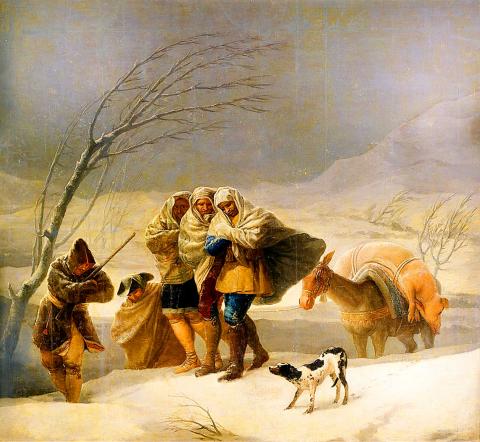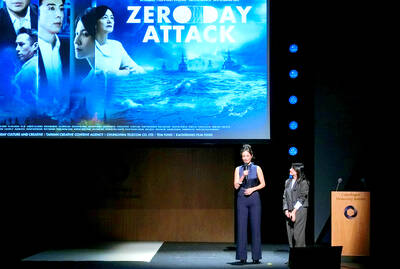Chinese practice
雪中送炭
to send charcoal in snowy weather

Photo: Wikimedia Commons
照片:維基共享資源
(xue3 zhong1 song4 tan4)
南宋詩人范成大(西元一一二六~一一九三)曾作一詩《大雪送炭與芥隱》,描述他在大雪中帶著木炭送去給朋友,因為擔心朋友家裡沒柴火可以取暖。但他又怕朋友覺得受接濟而難為情,便跟朋友說,拿木炭去不過是訪友的藉口,他真正的目的是要請朋友為他作一首詩。
范成大送炭的典故來自時間早他兩世紀的北宋太宗(西元九三九~九九七)的軼事。宋太宗在位晚年,有一段時間天氣特別寒冷,大雪不斷,太宗便命屬下分送木炭等物資給民眾,避免他們凍死。成語「雪中送炭」(原作「雪裡送炭」)便是出自這充滿愛心的故事,字面意義為在下雪的天氣中送出木炭,引申為在別人最需要時提供援助。
在英文中,有兩種說法可以表達「雪中送炭」的意思,一為to send help in somebody’s hour of need(在某人需要的時刻提供幫助),另一為「to send in the cavalry」(派騎兵來)。
騎兵隊是騎馬的兵團,因而是軍中行動最迅捷的單位,需要時可以支援到很遠的地方。當我們說「it’s time to call in the cavalry」(該找騎兵了),意思是說我們需要強有力的盟友趕快來幫忙。
(台北時報編譯林俐凱譯)
年關將近,善心人士捐贈大筆物資給育幼院童,這真是雪中送炭啊!
(The year is coming to an end, and compassionate people are donating piles of gifts to orphanages, it’s like a blessing from Heaven for the kids.)
雪中送炭的人才是真朋友。在你風光時想跟你攀關係的多是酒肉朋友。
(Your real friends are those willing to help in your hour of need. Those trying to hitch a ride when you’re doing well for yourself are nothing but fair weather friends.)
英文練習
in your hour of need
send in the cavalry
The Southern Song dynasty poet Fan Chengda (1126AD to 1193AD) wrote a poem entitled “Offering charcoal to Jie Yin in heavy snow.” In the poem, Fan talks of how, during a period of heavy snow, he goes to the house of a friend with a gift of coals, concerned his friend would have nothing to heat his house with. Perhaps worried that the friend might feel embarrassed at his act of charity, Fan tells him that the charcoals were merely a pretext for his visit, and that his true purpose was to have him compose a poem for him.
Fan’s offering of coals is a reference to an anecdote dating to the Northern Song period two centuries previously. The story goes that, toward the end of his reign, during a particularly long cold spell with days of continuous snowfall, Emperor Taizong (939AD to 997AD) had his officials distribute coals so that people would not perish from the cold. From this story of compassion came the idiom 雪中送炭, originally written 雪裡送炭, literally meaning “to send charcoal in snowy weather” and, by extension, offering help at times it is most needed.
In English, there are two ways to describe the idea of sending help at a crucial time. The first is to send help in somebody’s hour of need. The second is “to send in the cavalry.”
The cavalry is a regiment of soldiers mounted on horseback, and therefore the most mobile unit in the army, who could quickly cover great distances when required to. When we say “it’s time to call in the cavalry,” we mean we need help from a powerful or capable ally, and quickly.
(Paul Cooper, Taipei Times)
Quick. Call in the Cavalry. See if Andy is answering his phone.
(快!快找救兵!看安迪會不會接電話。)
I can always rely on Kate to help me in my hour of need.
(在我最需要的時候,凱特總會幫我。)

A: Wow, Les Miserables Staged Concert Spectacular is visiting Taiwan for the first time. B: Isn’t Les Miserables often praised as one of the world’s four greatest musicals? A: Yup. Its concert is touring Taipei from tonight to July 6, and Kaohsiung between July 10 and 27. B: The English version of the French musical, based on writer Victor Hugo’s masterpiece, has been a huge success throughout the four decades since its debut in 1985. A: The musical has never toured Taiwan, but going to the concert sounds like fun, too. A: 哇,音樂劇《悲慘世界》紀念版音樂會首度來台巡演! B: 《悲慘世界》……它不是常被譽為全球四大名劇之一嗎? A: 對啊音樂會將從今晚到7月6日在台北演出,從7月10日到27日在高雄演出。 B: 這部法文音樂劇的英文版,改編自維克多雨果的同名小說,自1985年首演以來,在過去40年造成轟動。 A:

Some 400 kilometers above the Earth’s surface, the “International Space Station” (ISS) operates as both a home and office for astronauts living and working in space. Astronauts typically stay aboard the station for up to six months and engage in groundbreaking research projects in various fields, such as biology, physics and astronomy. These projects help scientists understand life in space and contribute to advancements that benefit people on Earth. The ISS has experienced significant growth since construction began in 1998. The station’s design and assembly represent an extraordinary international collaboration among Canada, the European Union, Japan, Russia and the United States.

A: While hit musical Les Miserables’ concert tour kicks off, South Korean drama Squid Game 3 will be back at the end of this month. B: New Taiwanese dramas The World Between Us 2 and Zero Day Attack have also gained attention. A: I heard that Zero Day Attack is a story about the Chinese Communist Party’s People’s Liberation Army trying to attack Taiwan by force. B: The drama’s subject is so sensitive that it has sparked a lot of controversy in society. A: I just hope that such a horrible story will never happen in

Continued from yesterday(延續自昨日) https://www.taipeitimes.com/News/lang Living on the ISS is challenging due to the absence of gravity. Astronauts must strap themselves into sleeping bags to prevent floating away while they sleep. They also spend about two hours exercising daily using specialized equipment. Despite this, microgravity can cause muscle loss, bone density reduction and cardiovascular changes. As a result, astronauts require extensive rehabilitation upon their return to Earth. In spite of these difficulties, astronauts often describe their experience on the ISS as life-changing. One of the most awe-inspiring aspects of living aboard the space station is the unparalleled view of Earth. Traveling at